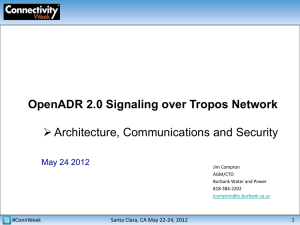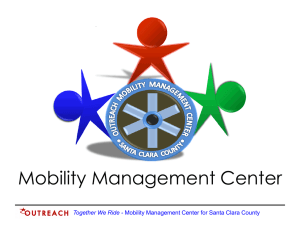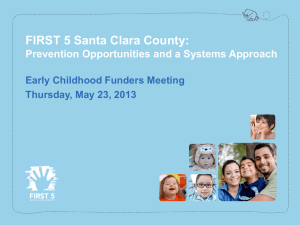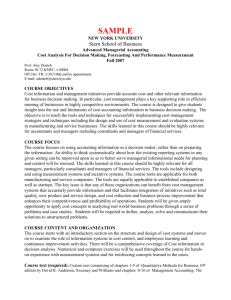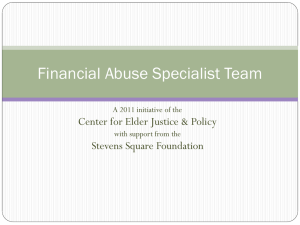EMQFF Crisis Program Presentation to MHB
advertisement
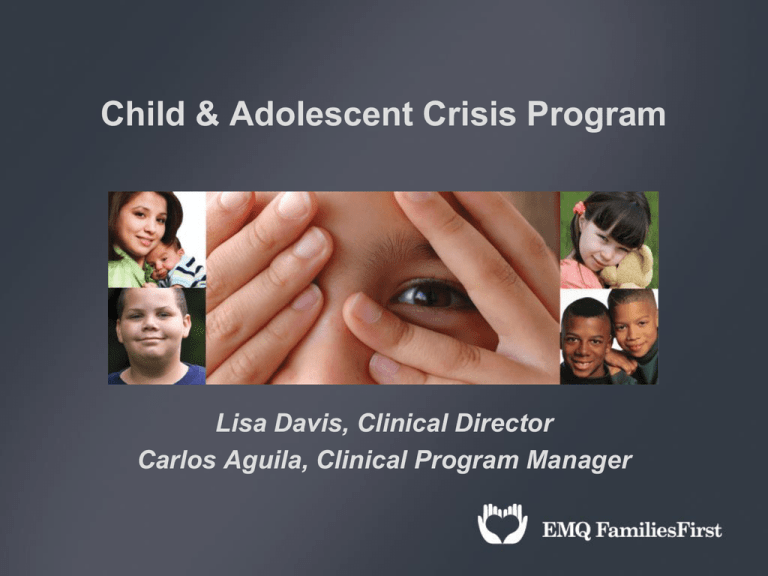
Child & Adolescent Crisis Program Lisa Davis, Clinical Director Carlos Aguila, Clinical Program Manager Child and Adolescent Crisis Program (CACP) • Providing mobile community based crisis intervention services for 19 years • CACP is referred to as the “safety net” for Santa Clara County • Serve 650 youth annually • Achieve a hospitalization diversion rate of 70% 2 CACP- Uniqueness • • • Target population to include every child and adolescent living in Santa Clara County Service availability to every school, clinic, police and sheriff departments, and the community at large. Specialty expertise of the clinical staff – Training in all aspects of crisis intervention – Average years of employment is 14.5 • Provide training in crisis intervention to community partners Outcomes: – Improves the overall crisis response of our community – Improves the handling of crises by recipients of the training – Targets specifically their ability to reduce the trauma and stigma of the crisis experience for kids and families involved. 3 Santa Clara County Police Departments • • • • San Jose Milpitas Sunnyvale Morgan Hill • • • • Santa Clara Campbell Palo Alto Los Altos Santa Clara County Mental Health Community Partners • • • • • • • • • 4 Alum Rock Bill Wilson Center Center for Living with Dying Las Plumas Mental Health Fair Oaks Mental Health Bascom Mental Health Ujirani Family Resource Center AACI Ujima Adult and Family Services • • • • • • • • Gardner Mental Health KARA Santa Clara County Mental Health YWCA Rape Crisis Center San Andreas Regional Center Almaden Valley Counseling Services Parents Helping Parents NAMI Santa Clara County Schools (partial listing) • • • • • • • • • • • • • 5 Addison Almond Bernal Blach Braham Challenger Covington Dartmouth Daves Del Mar Escondido Fair Fischer • • • • • • • • • • • Gardner Loyola Gunderson Gunn Hubbard James Lick John Muir Linda Vista Loma Prieta Los Gatos Montgomery Ocala M.S.C. T. English M.S. • PACT/Sherman Oaks • Palo Alto • Pioneer • Reed Elementary • Rolling Hills • Rosemary • San Jose City College • Sheppard • Silver Creek • St Justin • Stipe • Stratford Who We Serve • Community Quotes – " Thank you so much for the work that you do. Your services are definitely needed in and are an asset to the community.” Barbara Thompson- NAMI National Alliance for the Mentally ill. – "Teaming with the mobile crisis program in assessing the kids that come into our ER, allows our staff to more thoroughly serve our other patients that come into our ER. Without their service, our hospital staff would be spread very thin in meeting the needs of all of our clients." El Camino Hospital – "The crisis team allows our department's officers to leave the scene of a call with the confidence that the families they are serving will be immediately helped. As an added bonus, the families served by the crisis team are linked up with long term resources in the community which ultimately translates into fewer future calls." San Jose Police Department Sergeant – "Wouldn't know what to do without the Crisis team. Your team has assessed hundreds of kids in our district, and have saved lives!" Rachael Bull-Eastside Union School District 6 Program Service • Information and Referral – Consultation – Response 7 Intervention Process Phone Screen Initial Assessment Call Clinician(s) with Info Clinician (s) Arrive, Call Consultant Clinician (s) Begin Assessment Call Consultant-Determine Disposition (Hospitalization or Safety Plan) Present Case to HospitalGive heads-up to AMR Develop Safety Plan-1 hr. 30 minutes Pickup by AMR • Home • Residence Other than Home • Respite Placement (e.g., Bill Wilson Center, Other Family Member) • May Need to Arrange Transport Client in Transit to Hospital Referrals for Follow Up Care Bed Authorized by Hospital Call AMR with go-ahead Paperwork Processed 8 CACP Provides • • • • • • • • • 9 Rapid-response services to all children and families in Santa Clara County Services regardless of placement or funding Collaborative safety planning and mental health risk assessments Facilitation of emergency hospitalizations (5150) when necessary Services to reduce unnecessary, over-utilization of law enforcement resources Professional clinicians who provide therapeutic intervention Collaboration with other service providers working with youth Referrals, information and support to children, families and professionals in accessing services Training for community partners to support children and families in Crisis CACP Organizational Chart Clinical Director Lisa Davis, MFT Associate Clinical Director Linda Nunn, MFT Administrative Assistant Terrie Day Clinician I Full-Time Bryan Rich, Ph.D., LMFT Patricia Carrillo, ASW Lieu Tran, ASW 10 CACP Clinical Program Manager Carlos Aguila, ASW Clinician I 19-Hour Craig Barton, ASW Melanie Valdez, ASW Regan R Hunt, LCSW Clinician I On-Call Ana Bandjak, MFTI Carlos Smith, ASW Kevin Burnside.MSWI Marie Busque, LCSW Clinician I On-Call Mark Taberna, MFTI Melanie Valdez, ASWl Michelle Jio, MFTI Steven Richmond, LMFT Trisha Graves, .ASW Staff Comments “I do crisis work because it's endlessly fascinating and compelling, because it enables me to work with wonderful people on my team and in the community, because it helps me grow as a person and because I have a deep wish to provide service to others. I love crisis work because it gives me the opportunity to connect with the profound and awe-inspiring depths and resources of the human spirit, in clients and coworkers, day after day.” 11 Staff Comments • “I enjoy training staff and responding to Crisis....Every day is different and every day I am able to do something, at that moment, to really help children and their families when they are hurting the most.” 12 Being Culturally Sensitive • EMQ FamiliesFirst’s Child and Adolescent Crisis program ensures that culturally competent services are provided by: – Maintaining a diverse staff with language capacity to match the rich diversity of Santa Clara County – Continuous training and supervision on cultural awareness – Providing services in the child/caregiver’s preferred language – Providing written materials in the child/caregiver’s preferred language – Assessing for cultural needs and factors that could impact services 13 Staff Ethnicity Bi/Multi-Racial 13% African American 13% Filipino 6% Latin American/ Hispanic 25% Caucasian 37% 14 Pacific Islander 6% Staff Language English only 39% Vietnamese 6% French 6% Bosnian 6% Serbian 6% Spanish 31% 15 Croatian 6% Youth Served 2010-11 90 80 81 81 70 71 68 60 55 50 45 40 10 0 16 48 41 30 20 55 31 21 20 Jul Aug Sept Oct Nov Dec Jan Feb Mar Apr May Jun N=617 Youth Ethnicity 0.2% 0.3% 0.6% 1.5% 1.9% 0.3% 3.2% 4.5% 0.8% 0.2% 1.3% 0.6% 0.2% 0.2% 0.3% 0.2% 31.9% Caucasian 2.9% 1.3% 30.5% Hispanic 0.3% 5.2% African American 17 11.5% Mex-American/Latino Caucasian Mex-American/Latino African-American Native American Hispanic Other Asian/Pac Island Chinese Cambodian Filipino Other Southeast Asian Vietnamese Latin American Japanese Non-White Other Unknown Samoan Asian Indian Hawaiian Native Korean Laotian Former Soviet Mulitple Youth Language Youth Language N=617 English 0.3% Spanish 0.2% 0.3% 0.3% 8.4% Spanish 0.8% 0.3% Vietnamese 0.2% 0.2% Chinese Chinese Dialect Farsi/Persian Hindi 89.0% English Tagalog Other Unknown/Not Reported 18 Who We Serve 19 • Profile • Success Story – Ryan Quotes from Families • " Quick response, very thorough, and professional." • "To know this service is available so we don't have to go to the hospital again." • “Clinician was very informative, patient, and knowledgeable. Clinician effectively answered my questions.“ • "They were very understanding and listened to my problems, and don't judge me." • "Care was thorough. The staff was highly skilled.“ • "The counselors are kind and helpful, and I also liked knowing that I have extra support when I need it.“ • "Team showed us different ways to cope with my daughter.“ • " The counselor approach was positive and was able to provide excellent information.” 20 Hospitalizations/Safety Plans FY10-11 185 (29.98%) Number of Hospitalizations Number of Safety Plans 432 (70.02%) Special note: Crisis response time is less then 60 minutes 100% of the time. 21 “We do whatever it takes” 22

